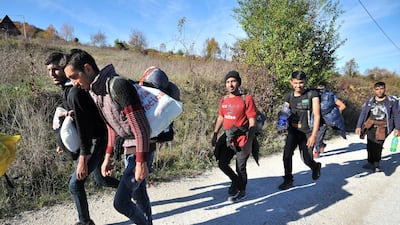Migrants have been beaten with sticks at the borders of European countries and violently forced out of EU territory, an investigation has found.
The “pushbacks” allegedly carried out by authorities in Greece, Croatia and Romania were condemned by human rights activists as alarming and illegal.
They came to light in a nine-month investigation by journalists across Europe who flew drones in border areas and disguised themselves as fishermen to go undercover.
In one of the videos described as "very concerning" by the European Commission, people were filmed being beaten on the Croatian border by masked men who were said to be part of a special police unit.
One of the guards was heard shouting “go to Bosnia”, as migrants tried to cross from the country into EU member Croatia.
Some of the migrants were from Afghanistan and Pakistan and were subsequently treated for injuries consistent with being beaten by police.
German magazine Der Spiegel, part of the investigation led by Dutch organisation Lighthouse Reports, described the special forces as a “shadow army that beats people out of the EU”.
An anonymous member of the Croatian forces told German broadcaster ARD they would receive orders from Zagreb on whether to force migrants back, detain them or let them apply for asylum.
“When we find migrants in the woods or somewhere else, they normally lie on the ground out of fear,” they said. “A police officer will then go alongside them and hit them with a stick on the legs.”
Amnesty International said the uniforms worn by the masked men matched those of known special police units.
“While the officials’ clothes are deliberately stripped of identifying insignia, it is clear that their uniforms, weapons and equipment are identical to those used exclusively by the Croatia’s special police,” said Balkans expert Jelena Sesar.
The Croatian police “has been notorious for conducting violent pushbacks for years now,” she said.
Adalbert Jahnz, a spokesman for the European Commission, said on Thursday that the reports and footage were very concerning.
“Acts of violence and mistreatment of migrants, asylum seekers and refugees are unacceptable and they must be investigated,” he said.
“The Commission strongly opposes any pushback practices, and has repeatedly emphasised that any such practices are illegal.”
Aegean Sea claims
Further reports made allegations of pushbacks in Greece, where coastguard units were said to have intercepted migrant boats and set them adrift in the Aegean Sea.
Jack Sapoch, a US migration expert who was involved in the investigation, said masked men had been involved in at least 15 incidents in Greece.
Further investigations showed they appeared to belong to one of the multiple elite coast guard units run by the Greek government.
In Romania, secret cameras recorded at least 38 people being pushed back by border guards on five separate occasions, Mr Sapoch said.

The governments involved have not commented on the claims. Greece has denied previous accusations of pushbacks in the Mediterranean.
Pushbacks are regarded as illegal by organisations including the United Nations who say countries should grant people the right to apply for asylum under international law.
Efforts to overhaul the way asylum seekers are shared out within the EU have been bogged down in stalemate since reforms were proposed last year.
EU leaders have criticised some of Greece’s border tactics and called for a new monitoring system to prevent pushbacks at the bloc’s borders.
But Amnesty criticised the EU for helping its member countries to beef up their border operations. Experts have described a growing militarisation of the EU’s frontiers as politicians try to prevent a repeat of the 2015 refugee crisis.
“This is the latest evidence that unlawful pushbacks and violence against asylum-seekers and migrants are commonplace at the EU’s external borders,” said Ms Sesar.


